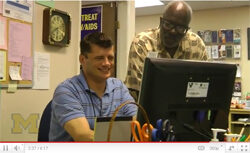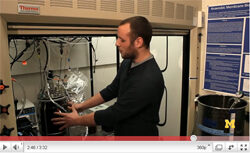Research News
-
Teach yourself to be wiser
Wise folks say that wisdom can only be earned by experience, but new research indicates that there might be a way to develop your capacity to make wise decisions.
-
'Dead' galaxies aren't so dead after all
“Scientists thought these were dead galaxies that had finished making stars a long time ago,” U-M researcher Alyson Ford said. “But we’ve shown that they are still alive and are forming stars at a fairly low level.”
-
AIDS at 30
When Michael Jonas learned he was HIV positive, he returned from Florida to his home in Jackson, Mich., to die. That was a decade ago, but Jonas is still alive, taking antiviral drugs and planning his future. His is one sign of progress in the 30 years since doctors first recognized the disease we now know as AIDS, but there’s still much to contend with.
-
A brain training exercise that really does work
The exercise led to lasting improve- ments in the ability to reason and solve new problems.
-
On the road again
Runners: ready to get back on the road, or build up for a race? U-M women’s cross country coach Mike McGuire offers tips for faster, safer recreational running.
-
Sinus care 101: Spring cleaning for your nose
It’s allergy season. Doctors from the Michigan Sinus Center offer tips for keeping your symptoms in check.
-
Squashed stars and a bungled theory
The hottest stars in the universe spin so fast that they get a bit squished at their poles and dimmer around their middle. A 90-year-old theory predicts the extent of this phenomenon—but a new U-M study shows that theory has major flaws. “It is surprising to me that von Zeipel’s law has been adopted in astronomy for such a long time,” says researcher Xiao Che.
-
Turning toilet water into energy and drinking water
U-M professor Lutgarde Raskin and her collaborators have developed what’s called an “anaerobic membrane bioreactor” that could make it possible to turn municipal wastewater into energy.
-
Someone to lean on
A new program at U-M aims to help patients with depression manage their symptoms by making someone who cares about them an important part of their treatment.









